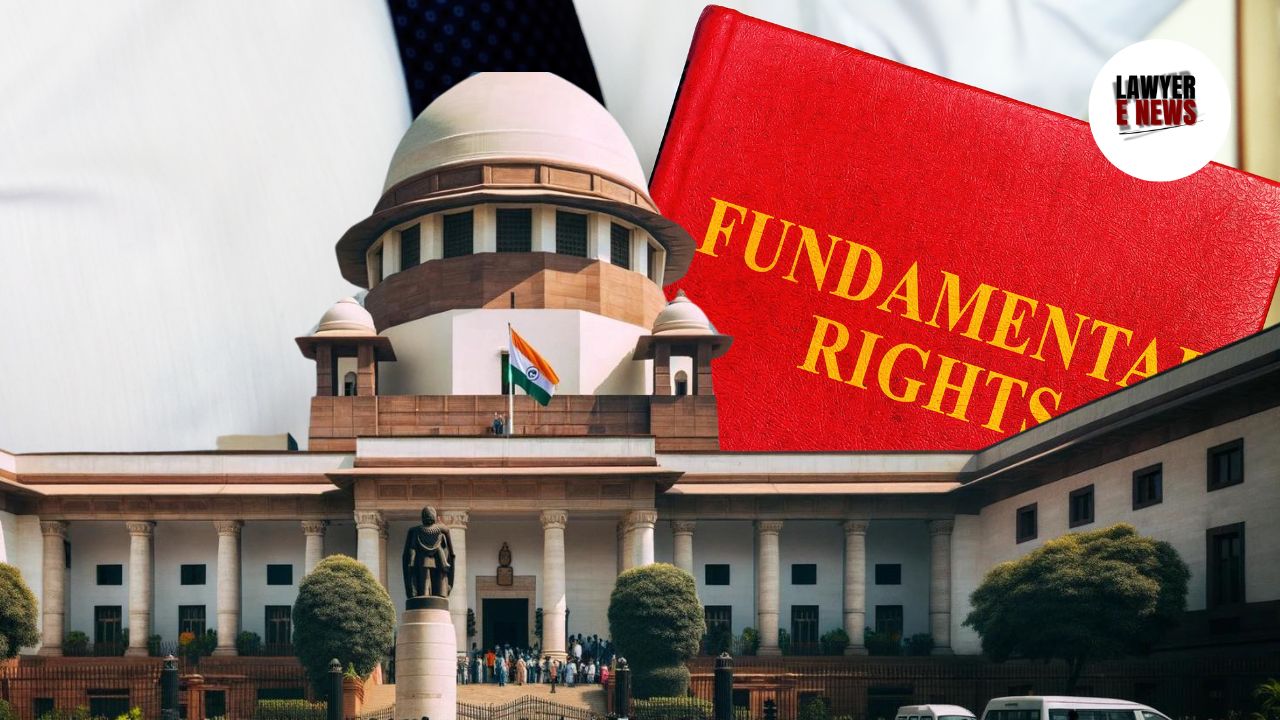-
by Admin
15 February 2026 5:35 AM



Legal aid to the poor should not be poor legal aid." — Supreme Court on Right to Legal Aid and Overcrowded Prisons. Supreme Court of India delivered a significant ruling in Suhas Chakma v. Union of India & Others, addressing the urgent issues of prison overcrowding and inadequate legal aid for undertrial prisoners. The Court held that legal aid is a fundamental right under Article 21 of the Constitution, emphasizing the need for effective legal representation for indigent prisoners. The Court also directed extensive reforms to tackle the issue of inhumane prison conditions caused by overcrowding and underlined the importance of equal justice under Article 39-A.
The case was initiated through a writ petition filed under Article 32 of the Constitution, focusing on the rights of prisoners subjected to overcrowded and unhygienic conditions in Indian jails. The petitioner, Suhas Chakma, sought the Court’s intervention to decongest prisons and provide humane treatment to inmates. Furthermore, the petition highlighted the lack of adequate legal aid for undertrial prisoners, particularly those who are unable to afford private representation.
The petitioner pointed to the existing laws, such as Sections 436, 436A, and 167(2) of the Code of Criminal Procedure (CrPC), 1973, which mandate timely bail for undertrial prisoners who have served a significant portion of their potential sentence. The Court noted that despite these provisions, thousands of prisoners remain incarcerated without trial, exacerbating the issue of overcrowded prisons.
The central issue revolved around the right to legal aid and ensuring that all prisoners, particularly undertrial prisoners, have access to effective legal representation. The case also examined the conditions of prisons, which, due to overcrowding, often result in inhumane and degrading treatment, violating the constitutional guarantees under Article 21 (Right to Life) and the international standards of human rights.
Another key concern was the implementation of Article 39-A of the Constitution, which mandates the provision of free legal aid to ensure that no citizen is denied access to justice due to economic constraints. The Court also reviewed the Legal Services Authorities Act, 1987, and emphasized the need to ensure that the National Legal Services Authority (NALSA) and other legal aid bodies function effectively.
The bench, comprising Justice B.R. Gavai and Justice K.V. Viswanathan, made critical observations about the importance of legal aid for prisoners. The Court emphasized that providing legal aid is not a mere formality, but a constitutional duty that must be actively implemented to ensure equal justice for all. The judgment quoted from previous landmark cases, including Hussainara Khatoon v. State of Bihar (1980), reaffirming that the right to legal representation is an essential part of fair trial standards under Article 21.
"Legal aid should not be just theoretically available; it must be effective, accessible, and diligently pursued," the Court stated, highlighting that lack of awareness and legal assistance often results in prolonged pre-trial detention, especially among indigent prisoners.
The Court's ruling detailed several systemic reforms aimed at improving the legal aid system for prisoners. It acknowledged the National Legal Services Authority's (NALSA) efforts in establishing Prison Legal Aid Clinics (PLACs) across 1265 prisons. These clinics, along with Jail Visiting Lawyers (JVLs) and Paralegal Volunteers (PLVs), have been instrumental in providing legal assistance to undertrial prisoners, filing bail applications, and addressing prison grievances.
In its detailed directions, the Court ordered:
NALSA, along with the State Legal Services Authorities (SLSAs) and District Legal Services Authorities (DLSAs), was directed to ensure that no prisoner is without legal representation.
Regular monitoring of legal aid services and periodic audits of the work done by Legal Aid Defence Counsels were emphasized.
Addressing Prison Overcrowding:
The Court stressed the importance of systemic reforms, including the establishment of Open Correctional Institutions and ensuring that bail provisions under the CrPC are effectively implemented to reduce overcrowding.
It was noted that over 3,24,867 inmates had received legal assistance in the year 2023-24, and efforts must continue to ensure the gap between eligible prisoners and those receiving aid is bridged.
The Court recognized the importance of NALSA's Early Access to Justice Framework, which provides legal assistance to suspects at the pre-arrest, arrest, and remand stages. This framework is crucial in preventing unlawful detention and ensuring that bail conditions are not excessively onerous.
Improving Awareness and Accessibility:
The Court emphasized the need for awareness campaigns to inform prisoners of their right to legal aid, particularly focusing on vulnerable groups, such as women, young offenders, and foreign nationals.
Suggestions included the display of legal aid information at public places like police stations, bus stands, and railway stations, and the use of radio and TV campaigns to reach out to rural areas.
The Court directed regular reviews of the Standard Operating Procedures (SOPs) governing legal aid services and prison management, with an emphasis on the need for continuous education and training for legal aid lawyers and volunteers.
Utilization of Technology:
The Court encouraged the use of E-prison modules and E-kiosks to allow prisoners and their families to access case information, parole status, and hearing dates. This technological intervention aims to bridge the information gap and improve transparency.
The Supreme Court's judgment is a landmark in reinforcing the right to legal aid as an integral part of the right to life and liberty. It underscores the need for efficient legal aid services, systemic prison reforms, and effective legal representation to protect the rights of undertrial prisoners and ensure humane treatment in prisons.
Date of Decision: October 23, 2024
Suhas Chakma v. Union of India & Others
